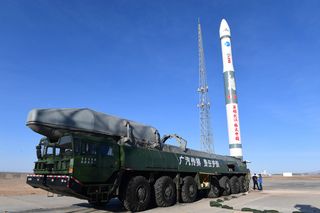Chinese Kuaizhou-1A rocket fails after launch, 2 satellites lost
The cause is under investigation, according to state media reports.

A Kuaizhou-1A solid rocket by Chinese commercial company Expace failed to make it to orbit Tuesday (Dec. 14), taking two commercial satellites with it during its demise.
The rocket launched from the China National Space Administration's Jiuquan Satellite Launch Center in the Gobi Desert at 9 p.m. EST (0200 GMT or 10 a.m. local time Wednesday, Dec. 15), according to a SpaceNews report, which cited airspace closure notices in pinpointing the launch time. On board the rocket were two satellites for Geespace, which were expected to test autonomous driving navigation assistance.
Chinese state media confirmed the failure in a news report. "The rocket flew abnormally and the launch mission failed. The specific reasons are being further analyzed and investigated," read part of a short article that was machine-translated from Chinese.
Related: The latest news about China's space program
Expace did have launch failures in July 2020 (during its first and so far, only launch of the larger Kuaizhou-11) and September 2020 of its Kuaizhou-1A rocket type. That said, the Kuaizhou-1A was on a streak of three successful launches in three months in September, October and November 2021.
SpaceNews added that Expace's struggles may present opportunities for other, emerging space companies in China to step into the gap and gain experience with launching boosters, while Expace figures out a recovery plan.
The launch attempt on Tuesday was the 51st reported for China in 2021, and the third failure. Earlier this year, China reportedly beat its national record of 39 launches in a year, which was achieved in both 2018 and 2020.
Get the Space.com Newsletter
Breaking space news, the latest updates on rocket launches, skywatching events and more!
Follow Elizabeth Howell on Twitter @howellspace. Follow us on Twitter @Spacedotcom and on Facebook.
Join our Space Forums to keep talking space on the latest missions, night sky and more! And if you have a news tip, correction or comment, let us know at: community@space.com.

Elizabeth Howell (she/her), Ph.D., is a staff writer in the spaceflight channel since 2022 covering diversity, education and gaming as well. She was contributing writer for Space.com for 10 years before joining full-time. Elizabeth's reporting includes multiple exclusives with the White House and Office of the Vice-President of the United States, an exclusive conversation with aspiring space tourist (and NSYNC bassist) Lance Bass, speaking several times with the International Space Station, witnessing five human spaceflight launches on two continents, flying parabolic, working inside a spacesuit, and participating in a simulated Mars mission. Her latest book, "Why Am I Taller?", is co-written with astronaut Dave Williams. Elizabeth holds a Ph.D. and M.Sc. in Space Studies from the University of North Dakota, a Bachelor of Journalism from Canada's Carleton University and a Bachelor of History from Canada's Athabasca University. Elizabeth is also a post-secondary instructor in communications and science at several institutions since 2015; her experience includes developing and teaching an astronomy course at Canada's Algonquin College (with Indigenous content as well) to more than 1,000 students since 2020. Elizabeth first got interested in space after watching the movie Apollo 13 in 1996, and still wants to be an astronaut someday. Mastodon: https://qoto.org/@howellspace
